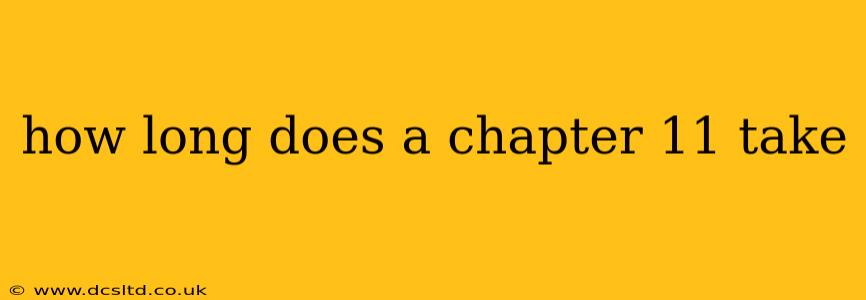Navigating the complexities of Chapter 11 bankruptcy can feel overwhelming. One of the most frequently asked questions revolves around the duration of the process. Unfortunately, there's no simple answer; the timeline for a Chapter 11 case is highly variable and depends on numerous factors. This article explores the key influences on case length and provides insights into what debtors and creditors can expect.
What Factors Influence the Length of a Chapter 11 Case?
Several interconnected elements significantly impact the time a Chapter 11 bankruptcy takes to resolve. These include:
-
Complexity of the Debtor's Finances: Businesses with intricate financial structures, numerous creditors, and extensive assets will naturally require more time to analyze and reorganize. Simplifying financial records before filing can expedite the process.
-
Cooperation Among Stakeholders: A collaborative atmosphere between the debtor, creditors, and the bankruptcy court significantly accelerates the proceedings. Agreements reached early on regarding debt restructuring and repayment plans can shorten the timeline considerably. Conversely, contentious disputes and disagreements can cause significant delays.
-
Size and Number of Creditors: Dealing with a large number of creditors with varying interests necessitates more time for negotiation and compromise. The larger the number of claims, the more complex the process becomes.
-
Effectiveness of Management: The debtor's management team's efficiency in managing the bankruptcy process is paramount. Effective communication, timely filings, and proactive engagement with stakeholders contribute to a shorter case duration.
-
Legal and Professional Expertise: Experienced legal and financial professionals can streamline the process, leading to more efficient negotiations and quicker resolutions. Conversely, inexperienced counsel may prolong the proceedings.
-
Court Backlog and Judge's Caseload: Court backlogs and the judge's caseload can directly influence the timeline. Some jurisdictions experience longer processing times than others.
How Long Does a Chapter 11 Bankruptcy Typically Take?
While there's no set timeframe, Chapter 11 bankruptcies can generally range from a few months to several years. Smaller, simpler cases with cooperative stakeholders might conclude within a year, while larger, more complex cases could easily extend beyond three years. Many cases fall somewhere in between these extremes.
What Happens During a Chapter 11 Bankruptcy?
The Chapter 11 process typically involves several key phases:
-
Filing the Petition: The debtor files a petition with the bankruptcy court, initiating the legal proceedings.
-
Development of a Reorganization Plan: The debtor, often with the assistance of professionals, creates a plan to restructure its debts and operations.
-
Negotiations with Creditors: The debtor negotiates with creditors to gain their approval of the reorganization plan.
-
Confirmation of the Plan: The bankruptcy court reviews and confirms the reorganization plan if it meets legal requirements and is approved by creditors.
-
Implementation of the Plan: Once confirmed, the debtor implements the plan, which might involve debt reduction, asset sales, or operational changes.
Can I Predict How Long My Chapter 11 Case Will Take?
Precisely predicting the duration of a Chapter 11 case is difficult. However, by understanding the factors outlined above and working closely with experienced bankruptcy professionals, debtors can aim to streamline the process and strive for a more efficient resolution.
What are the Costs Involved in Chapter 11 Bankruptcy?
The cost of Chapter 11 can be substantial, including attorney's fees, accountant's fees, and other professional expenses. These costs often depend on the complexity of the case and its duration.
How Can I Minimize the Length of My Chapter 11 Case?
Proactive steps to minimize the duration include:
-
Thorough Preparation: Ensure accurate and readily accessible financial records.
-
Cooperation with Stakeholders: Engage in open and constructive communication with creditors.
-
Experienced Professionals: Retain experienced bankruptcy attorneys and financial advisors.
By understanding the factors influencing the length of a Chapter 11 bankruptcy and taking proactive steps to streamline the process, businesses can aim for a quicker and more efficient resolution. However, it's crucial to remember that every case is unique, and professional guidance is essential throughout the proceedings.
